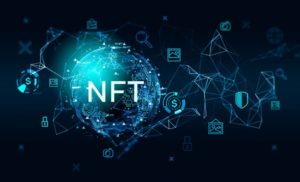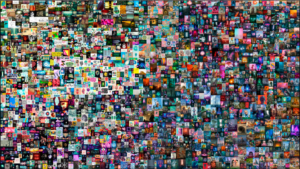NFTs (non-fungible tokens) are digital assets that are securely stored on a blockchain platform. Holders are granted access to exclusive content and prizes associated with these tokens, typically in the form of artwork. This functionality allows for the creation of unique digital assets and items that can be bought or sold by anyone in an open market. They are quickly becoming the most prominent advocates for transformation.

NFT in the art world
NFTs are having a huge impact on the art world. They give artists more control over their work, allowing them to make money and receive royalties for their art without relying on the private art market. In addition, buyers have the assurance of a permanent certificate of ownership on the blockchain. These digital tokens are transforming the way art is bought and sold, creating opportunities for any artist to be successful regardless of market recognition. As blockchain technology continues to be applied to digital and non-digital art, the possibilities are endless.
The most popular NFT, Beeple’s “Everydays: the First 5000 Days” sold for around $69 million.
Democratization
NFTs have a democratizing effect. By owning an NFT, users can buy into a decentralized autonomous organization (DAO) with voting rights. NFTs also provide a democratic approach to art and can be used as memberships for various organizations, clubs, or movements. XRToday states that DAOs allow NFT fans and creators to collectively share ideas and contribute to its future.
Decentralization
Decentralization is the idea of placing decision-making power in the hands of more people who are not part of the traditional power structures. NFTs, Web3, and other metaverse technologies help make this possible. Through decentralization, businesses cannot regulate the parameters of this autonomous community; rather, it is managed by a group of people with no typical business hierarchy, via a system called DAO (Decentralized Autonomous Organization). This system is recorded and managed on the blockchain, which removes the need for centralized entities.
NFT and the Community
NFTs can help brands build communities of loyal supporters. This decentralized and democratic space gives power to both the consumer and the creator, allowing them to choose where to spend their money and time. A well-crafted NFT project, with an effective roadmap and a team to support it, can form a community for and with the NFT creator. To be successful, the process should be intentional. The roadmap is our chance to be transparent about what the community will get for their money and how their engagement will be maintained after the NFT transaction. The real potential of NFTs lies in the ability to let people share a creative connection with the brand, rather than just offering a cool NFT collection.
Conclusion
NFTs, or Non-Fungible Tokens, are revolutionizing digital asset ownership and exchange. They are paving the way for digital communities, tradeable in-game assets, and the Metaverse economy. As more industries begin to recognize the enormous potential of NFTs, we can expect to see their use become increasingly prevalent. The future of NFTs is indeed a bright one, and the possibilities are limitless.

